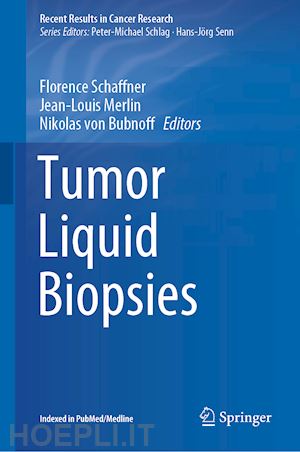

Questo prodotto usufruisce delle SPEDIZIONI GRATIS
selezionando l'opzione Corriere Veloce in fase di ordine.
Pagabile anche con Carta della cultura giovani e del merito, 18App Bonus Cultura e Carta del Docente
This book is a comprehensive guide to the techniques, clinical applications, and benefits of the different forms of liquid biopsy employed in patients with a variety of tumor types, including lung, breast and colorectal cancer. Offering detailed explanations, it discusses the how changes in tumors can be tracked using these cutting-edge technologies, which enable the detection and analysis of diverse circulating biomarkers: tumor cells, tumor DNA, tumor RNA (free or in exosomes), and fluid biomarkers identifiable by means of targeted proteomics. The use of such advanced technologies is enabling us to tackle questions and problems in a way that was not possible just a few years ago. We now have at our disposal an effective means of overcoming the problem of intratumor heterogeneity, which has limited the value of conventional biopsy approaches. As a consequence, oncology practice is about to change radically, toward truly personalized precision medicine. This book provides both clinicians and researchers with a thorough and up-to-date overview of progress in the field.
Circulating Tumor Cells: Pathophysiology of Tumor Cell Release into the Circulation and characterization of CTC.- CTC enrichment technologies.- Genotyping of CTC :example Lung cancer.- CTC in Breast Cancer: a clinical approach.- Circulating Tumor DNA: Pathophysiology of ctDNA Release into the Circulation and its characterization.- Enrichment and Analysis of ctDNA.- ctDNA in Lung Cancer.- ctDNA in Breast Cancer.- ctDNA in Colorectal Cancer.- Dynamic Treatment Stratification using ctDNA.- Circulating Tumor RNA: Noncoding Tumor RNAs: Pathophysiology of Release and Techniques of Detection.- Circulating miRNAs as Biomarker in Cancer.- Plasma Subcompartments as Source for Tumor derived Biomarkers: Exosomes and Vesicles as Biomarker in Cancer.- Quantitative proteomic Analysis of Plasma in Cancer.
Florence Schaffner obtained her PhD in Cell Biology and Biochemistry in Freiburg-im-Breisgau (Germany), in Prof. Hellmut Augustin’s angiogenesis and tumor biology lab. There, she studied in depth the role of the interaction between the receptor EphB4 and its ligand ephrinB2 during tumor angiogenesis and metastatic processes and in particular tumor cell seeding at the site of metastasis. She then took up a postdoctoral research position at Scripps Research Institute in California, under Prof. Wolfram Ruf, where she investigated the role of coagulation proteins such as tissue factor and the protease-activated receptor in tumor angiogenesis, metastasis, and cancer stem cell biology. She continued her work on cancer stem cells in France, in Dr. Dontenwill’s lab in Strasbourg. She now works at the Cancéropôle Grand-East, where she is developing new and innovative research axes in relation to translational medicine.
Jean-Louis Merlin obtained his PharmD in Lille (France) and his PhDand Research Direction degree in Nancy (France), while working in Prof. Vigneron’s lab (Faculty of Pharmacy) on innovative anticancer drug targeting in liposomes and molecular mechanisms of drug resistance in preclinical models. While head of the research lab at the Alexis Vautrin Cancer Center (now the Institut de Cancérologie de Lorraine) in Nancy, he became Professor of Cellular Oncology at the Faculty of Pharmacy. There he set up the tumor biology unit to implement the analysis of molecular tumor genetic markers in the clinical management of cancer patients. Professor Merlin coordinates the Advanced Diagnostic and Translational Research project of the CNRS research unit (UMR 7039) and the Translational Research axis at Cancéropôle Grand-East. He is also coordinating several clinical trials aiming at the validation of circulating tumor DNA as an alternative to tumor DNA for molecular diagnosis and follow-up of patients with colorectal and breast cancer, and melanoma.
Nikolasvon Bubnoff obtained his MD at the Ludwig Maximilian University in Munich and gained his postdoctoral qualification at the Technical University, Munich for work describing and characterizing secondary resistance mutations of the Bcr-Abl gene in CML. While a resident at Klinikum rechts der Isar (Munich) he continued working on molecular mechanisms of treatment resistance, establishing a cell line-based screening strategy for resistance to targeted cancer treatment. Professor von Bubnoff continued his work on circulating tumor (ct)DNA in gastrointestinal stromal tumors in Freiburg, where he established routine ctDNA testing in solid tumors. There, together with Robert Zeiser, he translated this preclinical work into clinical applications. Professor von Bubnoff is currently Deputy Medical Director of the Comprehensive Cancer Center Freiburg, where he has established a molecular tumor board to make use of genome analysis to guide treatment. He is currently coordinating clinical trials on ctDNA biomarkers, treatment optimization in CML, and ruxolitinib treatment of steroid-refractory GvHD.











Il sito utilizza cookie ed altri strumenti di tracciamento che raccolgono informazioni dal dispositivo dell’utente. Oltre ai cookie tecnici ed analitici aggregati, strettamente necessari per il funzionamento di questo sito web, previo consenso dell’utente possono essere installati cookie di profilazione e marketing e cookie dei social media. Cliccando su “Accetto tutti i cookie” saranno attivate tutte le categorie di cookie. Per accettare solo deterninate categorie di cookie, cliccare invece su “Impostazioni cookie”. Chiudendo il banner o continuando a navigare saranno installati solo cookie tecnici. Per maggiori dettagli, consultare la Cookie Policy.